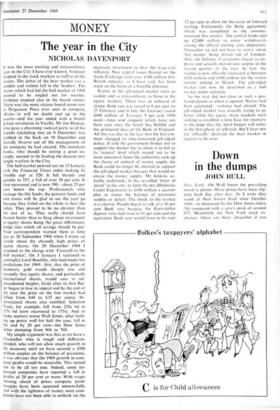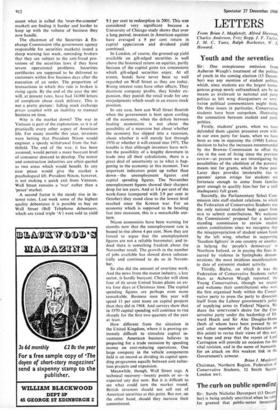Down in the dumps
JOHN BULL
New York—On Wall Street the prevailing mood is gloom. Share prices have been slip- ping back day after day. As I write they stand at their lowest level since October 1966—as measured by the Dow Jones index, 784 compared with a year's peak of around 975. Meanwhile the New York stock ex- changes (there are three altogether if you
count what is called the 'over-the-counter' market) are finding it harder and harder to keep up with the volume of business they now handle.
The chairman of the Securities & Ex- change Commission (the government agency responsible for securities markets) issued a sharp warning last week, reminding brokers that they are subject to the anti-fraud pro- visions of the securities laws if they have severe operational problems. Securities certificates are supposed to be delivered to customers within five business days after the execution of an order. The proportion of transactions in which this rule is broken is rising again. By the end of the year the SEC will, at present rates, have had 14,000 letters of complaint about stock delivery. This is not a pretty picture : falling stock exchange prices coupled with an inability to transact business on time.
Why is the market down? The war in Vietnam is part of the explanation, as it is of practically every other aspect of American life. For many months this year, investors were betting that President Nixon would engineer a speedy withdrawal from the bat- tlefield. The end of the war, it has been assumed, would permit a more buoyant level of consumer demand to develop. The motor and construction industries are often quoted as two areas which would benefit. In any case peace would give the market a psychological lift. President Nixon, however, is not making a quick exit from Vietnam. Wall Street remains a 'war' rather than a 'peace' market.
A second factor is the steady rise in in- terest rates. Last week some of the highest quality debentures it is possible to buy on Wall Street (Bell Telephone debentures, which are rated triple 'A') were sold to yield
9.1 per cent to redemption in 2001. This was considered very significant because a University of Chicago study shows that over a long period, investors in American equities have averaged a 9 per cent return in capital appeciation and dividend yield combined.
In London, of course, the grossed-up yield available on gilt-edged securities is well above the historical return on equities, partly because of the capital gains tax concessions which gilt-edged securities enjoy. At all events, bonds have never been so well regarded on Wall Street as they are today. Rising interest rates have other effects. They decimate company profits, they hinder ex- pansion, they punish the retail trade for any misjudgments which result in an excess stock position.
In any case, how can Wall Street flourish when the government is bent upon cooling off the economy, when the debate between leading economists is not about the possibility of a recession but about whether the economy has slipped into a recession, about whether it will merely last through 1970 or whether it will extend into 1971. The trouble is that although investors have writ- ten the possibility of a lengthy downturn in trade into all their calculations, there is a great deal of uncertainty as to what is hap- pening to the economy at this moment. Two important indicators point up rather than down—the unemployment figures and capital spending figures. The November unemployment figures showed their sharpest drop for ten years. And at 3.4 per cent of the work-force (compared with 3.9 per cent in October) they stand close to the lowest level reached since the Korean war. For an economy which is supposed to be heading fast into recession, this is a remarkable out- turn.
Nixon economists have been warning for months now that the unemployment rate is bound to rise above 4 per cent. Now they are forced to argue that the unemployment figures are not a reliable barometer; and in- deed there is something freakish about the November result. The growth in the number of jobs available has slowed down substan- tially and continued to do so in Novem- ber.
So also did the amount of overtime work. And the news from the motor industry, a key sector, is hardly buoyant. Chrysler will close four of its seven United States plants an ex- tra four days at Christmas time. The capital spending figures are perhaps even more remarkable. Business men this year will spend 11 per cent more on capital projects than they did in 1968. And surveys show that in 1970 capital spending will continue to rise sharply for the first two quarters of the year at least.
How different from the situation in the United Kingdom, where it is proving ex- tremely difficult to stimulate capital in- vestment. American business believes in preparing for a trade recession by spending money on cost-reducing operations. One large company in the vehicle components field is on record as dividing its capital spen- ding programme equally between cost reduc- tion projects and expansion.
Meanwhile, though, Wall Street sags. A technical recovery—twenty points or so—is expected any day now. But it is difficult to see what could turn the market round. British investors should not sell out of American securities at this point. But nor, on the other hand, should they increase their commitment.















































 Previous page
Previous page